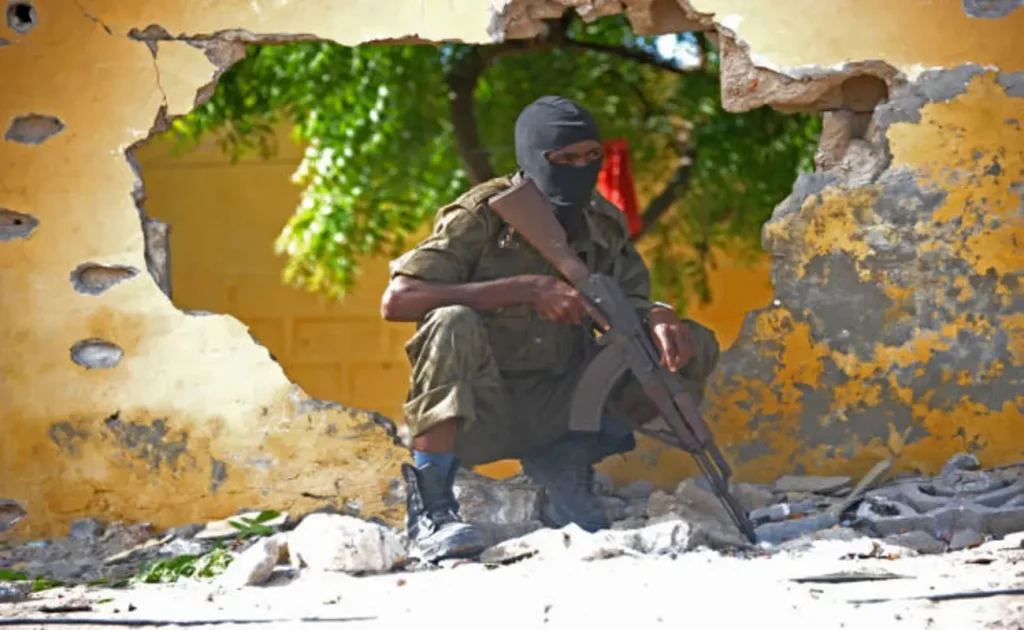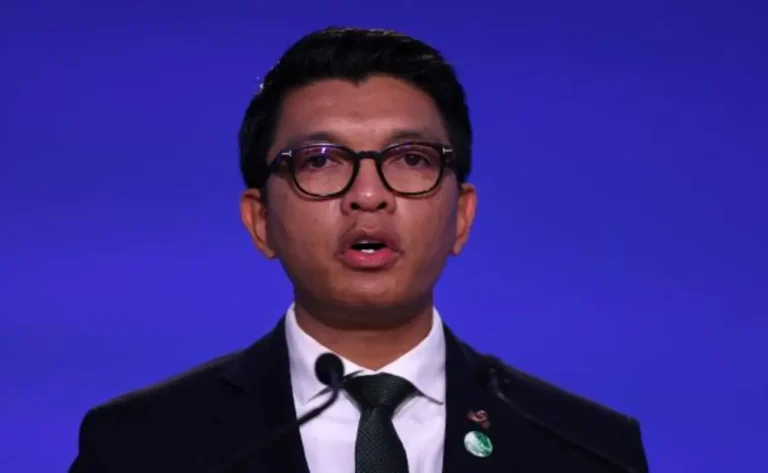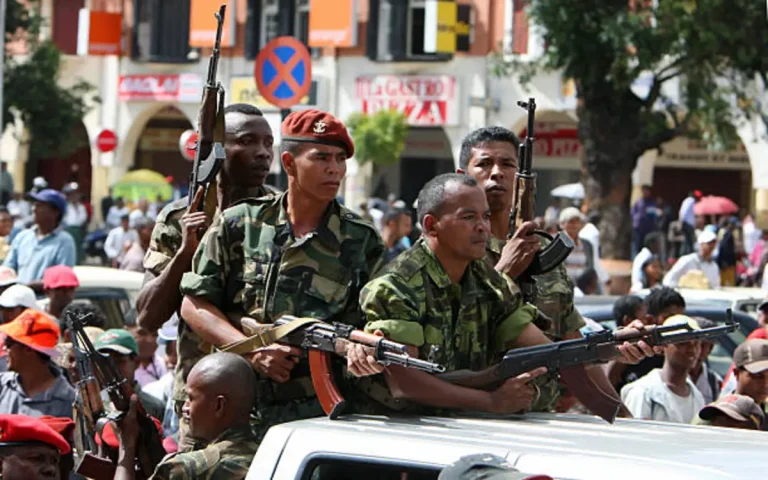
A Somali soldier stands guard at the site of an Al Shabab suicide attack on a military intelligence base in Mogadishu, Somalia, on June 21, 2015. MOHAMED ABDIWAHAB/AFP via Getty Images
Government Confirms Attack Near Villa Somalia
The assault targeted the Godka Jilaow detention facility, a heavily guarded complex close to the Villa Somalia presidential palace, where dozens of captured insurgents are held under strict confinement.
Authorities said the coordinated attack began with a powerful explosion at the prison gate, followed by a gun battle between militants and security personnel stationed at the site.
“We heard a huge blast at the cell gate and soon an exchange of gunfire started,” said Ahmed, a paramilitary soldier deployed in the area, speaking to Reuters. “More forces were deployed to eliminate the fighters. The operation is still ongoing.”
Residents living near the prison confirmed heavy gunfire through the night, describing the sound of automatic weapons and explosions echoing across the capital’s secure zone.
Militant Group Claims Responsibility
Al Shabaab, which has waged an insurgency in Somalia since 2007, claimed responsibility for the assault through a statement released by its media wing early Saturday.
“We targeted the underground cell guarded by security forces. First it was started with a suicide car bomb, and immediately infantry fighters went into the cell compound and they are fighting inside,” the group said in the statement, asserting there were casualties among soldiers.
The government later confirmed that some of the attackers had been killed in the counter-operation, while others remained trapped within sections of the complex as troops advanced room by room.
In a post on state television’s Facebook page, Somalia’s Information Ministry said the militants had used a car disguised as a security vehicle to breach the outer wall before the explosion tore open the main gate.
“Some of the fighters were shot dead. What’s going on now is the final operation to eliminate the fighters who attacked the place,” the ministry statement read.
Background of Ongoing Conflict
The al Shabaab insurgency has long challenged the federal government’s authority, despite international backing from African Union troops and Western partners.
Although the group has lost control of major urban centres, it continues to mount deadly bombings and ambushes across central and southern Somalia, often targeting government institutions and military bases.
Security analysts say the attack on the Mogadishu prison highlights al Shabaab’s capability to launch complex assaults deep inside heavily guarded areas.
“This is a reminder that the capital remains vulnerable, even with recent security gains,” said a regional analyst at the BBC’s Africa Service.
Somali Forces Continue Counter-Offensive
By late evening, officials said operations were ongoing as specialized units attempted to clear remaining gunmen from underground chambers within the facility.
Somali forces secured the perimeter around Godka Jilaow while reinforcements blocked nearby access roads to prevent further infiltration attempts.
Witnesses reported that emergency vehicles were seen transporting casualties from both sides, though the government did not immediately release an official death toll.
Medical sources said several wounded soldiers were treated at Mogadishu’s Medina Hospital following the exchange of fire.
Government Vows to Prevent Future Breaches
Interior Ministry officials said security measures across the capital would be tightened following the breach, describing it as a test of the country’s intelligence coordination.
“This was a complex attack involving deception and suicide tactics. The fact that it occurred so close to Villa Somalia will push for an internal review,” one senior security official said on condition of anonymity.
The Somali National Army, supported by international partners, has launched several offensives in rural regions to dismantle al Shabaab networks. However, analysts note that the group’s urban cells remain difficult to trace due to their covert operations and use of disguise tactics similar to those employed in Saturday’s assault.
The United States, which supports Somali counter-terrorism units through air surveillance and intelligence sharing, has previously emphasized the importance of sustained local capacity to prevent insurgent resurgence.
Reactions from the Public
Residents expressed fear and exhaustion following the overnight violence, describing it as one of the most intense battles seen near the presidential compound in recent months.
“We could not sleep because the shooting was non-stop,” said Amina, a shopkeeper living two streets away from Godka Jilaow. “People were terrified and stayed indoors until morning.”
Social media footage shared by residents appeared to show smoke rising over the district, though the government urged citizens not to spread unverified information online while security operations continued.
Somali Forces Maintain Control
By Sunday morning, Somali forces were reported to have regained full control of the facility and surrounding streets, according to official briefings broadcast on state media.
“Our troops have neutralized the attackers and secured the prison,” the Information Ministry said in an updated statement, confirming that investigations were underway to determine how the militants obtained security vehicle markings used in the attack.
The incident marks the latest in a series of high-profile assaults by al Shabaab targeting heavily fortified institutions in the capital.
Related: Julius Malema faces removal from parliament after conviction in firearm case
Security experts believe the group may have sought to free detained members or disrupt ongoing government prosecutions against senior insurgents.
Authorities have called on the public to remain vigilant as forces continue operations across Mogadishu’s key installations.
Reporting by Abdi Sheikh; additional reporting by Reuters, Mogadishu. Edited for Epicstorian News.


